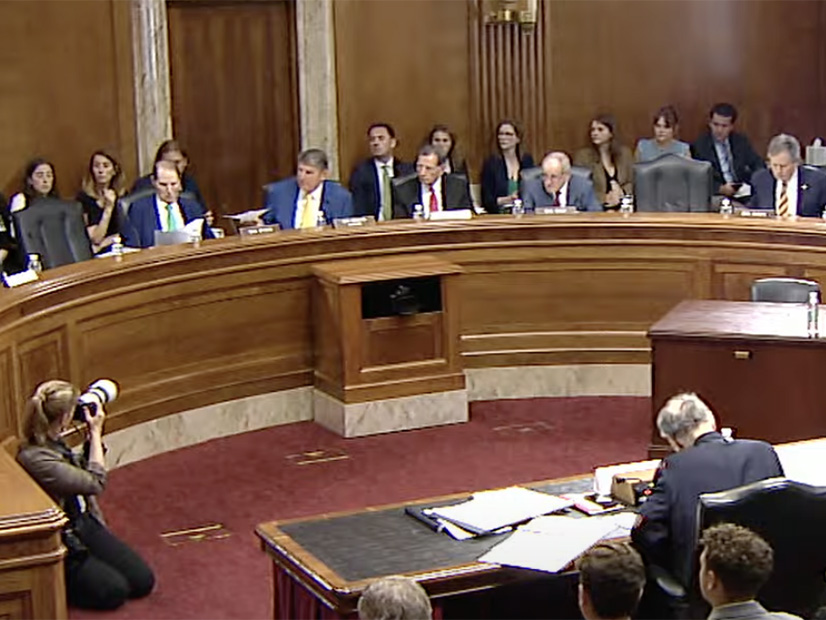
The Senate Energy and Natural Resources Committee voted 15-4 on July 31 to advance the Energy Permitting Reform Act of 2024 to the floor.
The bill, S.4753, was backed by committee Chair Joe Manchin (I-W.Va.) and Ranking Member John Barrasso (R-Wyo.) and includes changes to transmission siting and planning, mining, oil and gas drilling, and judicial review.
The committee worked on the legislation over the course of this congressional session, holding many hearings on permitting and related issues, Manchin said at the committee’s business meeting.
“I think the need for permitting reform has come up in almost every hearing that we’ve had this Congress,” Manchin said. “No matter what side of the fence you may be on, everyone knows it can’t happen unless we reform our permitting — how we do things. So, the time to act is now.”
While the bill awaits a potential vote on the floor, the Senate’s actual working days left this Congress are dwindling as lawmakers will take extended time off for the election this fall. The Senate leaves for summer break at the end of this week and is scheduled to be in session for only three more weeks before the election, with five weeks of a lame duck session on the schedule.
Numerous amendments were offered during the business meeting, but only one on forest restoration from Sen. Steve Daines (R-Mont.) passed. The committee voted down several others, including ones offered by Sen. Ron Wyden (D-Ore.) and Sen. Angus King (I-Maine) to ban offshore drilling off the West Coast and New England.
Sen. Josh Hawley (R-Mo.) offered the day’s only amendment on transmission, which the main bill would give FERC authority to site. Hawley’s amendment would have required any lines the commission sites to go through a regional planning process. Manchin said the language would threaten the existing backstop siting FERC implemented with Order 1977 and the committee rejected the amendment.
Other amendments, including one offered by Sen. Lisa Murkowski (R-Alaska) to make it easier for remote communities in her state to use small-scale hydroelectric and hydrokinetic generation, were withdrawn with promises from Manchin that changes could be made on the floor.
“After more than a year of bipartisan negotiations with Chairman Manchin, we are now one step closer to getting the bipartisan Energy Permitting Reform Act signed into law,” Barrasso said. “Our bill is a true, all-of-the-above energy policy — targeted, timely and good for all Americans.”
American Clean Power Association CEO Jason Grumet welcomed the bill, which he said would increase the resilience of the power sector and accelerate the deployment of clean energy.
“The leadership from the Senate Energy and Natural Resources Committee is critical to ensure that our nation can meet rapidly growing electricity demand,” Grumet said. “The legislation is both bold and balanced, creating an effective policy framework for building new high-voltage transmission. Building out new transmission will help ensure affordable, reliable energy for American businesses and consumers.”
The transmission language in the bill includes some language backed by Democrats and even environmentalists, with the House Sustainable Energy and Environmental Coalition’s Reps. Sean Casten (D-Ill.) and Mike Levin (D-Calif.) welcoming those provisions. The two have introduced the Clean Electricity and Transmission Acceleration Act, which includes similar transmission reforms.
“While there are aspects of the bill that can be improved upon and provisions that we have concerns about, we are eager to continue the critical discussion on permitting reform as we strive to enact a law that will equitably accelerate adoption of clean energy and transmission,” Casten and Levin said in a statement.
The Sierra Club found its opposition to the offshore drilling language and changes to permitting on federal law outweighed whatever benefits the transmission language would bring, saying it preferred the Casten-Levin legislation in the House.
“There are existing proposals that would offer real solutions to accelerate the deployment of clean energy without sacrificing the climate and public health for fossil fuel executives’ profits,” Sierra Club Beyond Fossil Fuels Policy Director Mahyar Sorour said in a statement. “It is possible, and necessary, to unleash renewable energy and supercharge the clean economy without undermining bedrock environmental laws. Congress must see through this ruse to give handouts to polluters and reject the Dirty Deal.”



